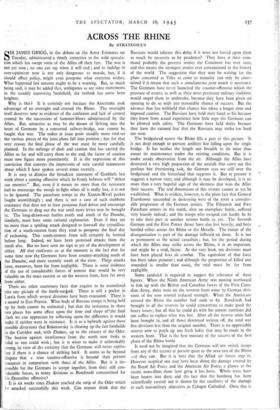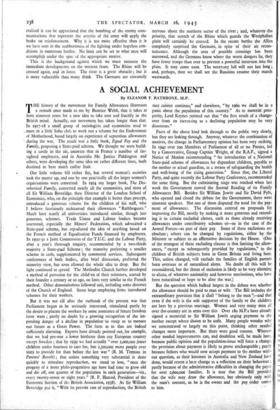ACROSS THE RHINE
By STRATEGICUS OIR JAMES GRIGG, in the debate on the Army Estimates on Tuesday, administered a timely corrective to the wild specula- tion which has swept some of the Allies off their feet. The war is not yet won ; no one can say when it will end ; and to indulge in over-optimism now is not only dangerous to morale, but, if it should affect policy, might even postpone what everyone wishes. What happened last autumn ought to be a warning. But, so much being said, it may be added that, ambiguous as are some movements in the steadily narrowing battlefield, the outlook has never been brighter.
Why is this? It is certainly not because the Americans took advantage of an oversight and crossed the Rhine. The oversight itself deserves note as evidence of the confusion and lack of control created by the succession of hammer-blows administered by the Allies. But, attractive as may be the dream of 'driving into the heart of Germany by a converted railway-bridge, war cannot be fought that way. The stakes at issue grow steadily more vital -as the various pieces of the joint plans fall into position ; but for that very reason the final phase of the war must be more carefully planned. In the mélange of dash and caution that has carried the Allies so far and will carry them to the end, the factor of caution must now figure more prominently. It is the expression of this conviction that conveys the impression of very careful manoeuvre about which I have spoken several times recently.
It is easy to dismiss the broadcast statement of Goebbels last week about a coming offensive which he firmly believes will "defeat our enemies." But, even if it means no more than the necessary bait to encourage the troops to fight when all is really lost, it is not to be ignored. The parachute troops in the Xanten-Wesel pocket fought astonishingly ; and there is not a case of such stubborn resistance that does not at least postpone final defeat and encourage the Germans to drag out the war until more levies may be brought in. The long-drawn-out battles north and south of the Danube, similarly, must have some rational explanation. Even if they are no more than a spoiling attack designed to forestall the crystallisa- tion of a south-eastern front they tend to postpone the final day of reckoning. This south-eastern front will certainly be formed before long. Indeed, we have been promised attacks from the north also. But we have seen no sign as yet of the development of either. All that confronts us at the moment is the fact that for some time now the Germans have been counter-attacking north of the Danube, and more recently south of the river. These attacks have, moreover, been far from negligible. There is some evidence of the use of considerable forces of armour that would be very valuable on the main eastern or on the western front, here far away from either.
Theie are other cautionary facts that require to be assimilated into any pictuee of the battle-outtook. There is still a pocket in Latvia from winch several divisions havp been evacuated. There is a second in East Prussia. What body of Russian troops is being held up by both cannot be estimated ; but that the resistance in these two places has some effect upon the time and shape of the final clash we can appreciate by reflecting upon the difference it would make if neither were in existence. It is as a bulwark against these possible diversions that Rokossovsky is clearing up the last footholds in the Corridor and, with Zhukov, up to the estuary of the Oder. The bastion against interference from the north now looks as solid as one could wish ; but it is wiser to make it unbreakably strong, in view of the certainty that the Germans will never capitu- late if there is a chance of striking back. It seems to be beyond dispute that a true counter-offensive is beyond their present resources in comparison with those of the Allies. But is it im- possible for the Germans to scrape together, from their still con- siderable forces as many divisions as Rundstedt concentrated for his December Offensive?
It is six weeks since Zhukov reached the strip of the Oder which he attacked successfully this week. Can anyone think that the
Russians would tolerate this delay if it were not forced upon thern as much by necessity as by prudence? They have at their com- mand probably the greatest armies the Continent has ever seen, and this means the strongest armies ever concentrated in the history of the world. The suggestion that they may be waiting for the plans concerted at Yalta to come to maturity can only be enter- tained if it means that such a simultaneous joint attack is necessary. The Germans have never launched the counter-offensive which the pressure of events, as well as their most persistent military tradition, would impel them to undertake, because they have been given no opening to do so With any -reasonable chance of success. But the advance that has withheld that chance has taken a longer time and imposed caution. The Russians have held their hand so far because they know from actual experience how little rope the Germans can be allowed with safety. The Germans have held theirs because they have the rational fear that the Russians may strike too hard too soon.
The bridgehead across the Rhine fills a part of this picture. -It is not deep enough to prevent artillery fire-falling upon the single bridge. It has neither the length nor breadth to do more than assure its maintenance under the existing conditions. But it is under steady observation from the air. Although the Allies have destroyed a very high proportion of the aircraft that carry out this perilous but threatening task, the German eyes are still over the bridgehead and the hinterland that supports it. But at present it suggests a narrow vent; and although it may be developed, it is no more than a very hopeful sign of the alertness that won the Allies their success. The real dimensions of this victory cannot as yet be established. What is evident, however, is the plain fact that General Eisenhower succeeded in destroying west of the river a consider- able proportion of the German armies. The Fifteenth and First Parachute armies in the north, after an exemplary battle, suffered very heavily indeed ; and the troops who escaped can hardly be fit to take their part in another serious battle as yet.. The Seventh German and the First Panzer Army have also lost heavily, and been hustled either across the Rhine or the Moselle. The extent of the disorganisation is part of the damage inflicted on them. It is not as permanent as the actual casualties ; but, for the period during which the Allies may strike across the Rhine, it is an important, and might be a vital, factor. At the very least, ten divisions must have been placed hors de combat. The equivalent of that force has been taken prisoner ; and although the proportion of killed and wounded is smaller than usual, the total must be far from negligible.
Some yardstick is required to suggest the relevance of these figures. When the Ninth American Army was moving northward to link, up with the British and Canadian forces of the First Cana- dian Army, there were on the western front some 70 German divi- sions of the now normal reduced strength. When the Americans crossed the Rhine the number had sunk to 65. Rundstedt had brought in all the reserves he could concentrate to make good the heavy losses ; but all that he could do with his utmost exertions did not suffice to replace what was lost. After all the reserve units had been brought in, and all those destroyed written off, the total was five divisions less than the original number. There is no appreciable reserve now to patch up any fresh holes that may be made in the western front. That is the best measure of the success of the first phase of the Rhine battle.
It need not be imagined that the Germans will not switch troops from any of the sectors at present quiet to the area east of the Rhine —if they can. But it is here that the Allied air forces step in. However sceptical one may have beat about the damage created by the Royal Air Force and the American Air Force, a glance at the recent news-films show how great it has been. Whole areas have been beaten into dust; and the fact that the bombing has been scientifically carried out is shown by the smallness of the damage to such non-military objectives as Cologne Cathedral. Once this is
realised it can be appreciated. that the bombing of the enemy com- munications that represent the arteries of the army will apply the brake on reinforcement. Why it is not more effective than it is we have seen in the stubbornness of the fighting under hopeless con- ditions in numerous battles: No limit can be set to what men will accomplish under the spur of the appropriate motive.
This is the background against which we must measure the immediate developments on the western front. The Rhine will be crossed again, and in force. The river is a great obstacle ; but it is more vulnerable than many think. The Germans are extremely nervous about the northern sector of the river ; and, whatever, the priority, that stretch of the Rhine which guards the Westphalian plain- will certainly be crossed. In the recent battles the Allies completely surprised the Germans, in spite of their' air recon- naissance. Although the area of possible crossings has been narrowed, and the Germans know where the worst dangers lie, they have fewer troops than ever to prevent a powerful incursion into the plain. It may come soon. The necessary lull will not last long ; and, perhaps, then we shall see the Russians resume their march westwards. ,



























 Previous page
Previous page